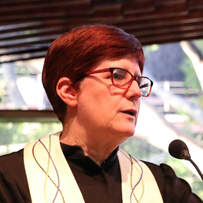 By Rev. Kathleen Owens, LeadMinister Unitarian Universalism is a covenantal faith. This means we don't follow a fixed creed handed down from a religious authority; we create a covenant for how we want to be in relationship with each other in this faith community. In 2008, this congregation created a church-wide covenant. As I mentioned in my May 23, 2021 "Real Community: Messy, Imperfect and Needed," this covenant hangs in every room at both our Hillcrest and South Bay campuses. It's also on our website - under the About menu tab, click on Governance; under Guidelines, you?ll find our Covenant of Good Relations. It explains how we'll be together, and says "we practice the established process of resolving differences." At one time, this was through a team called the Good Relations Committee. This team created guidelines and a process to be used when covenant was strained or when tension arose. After awhile, it became harder to retain committee members, because the committee wasn't used very often.
In December 2018, we re-centered our Journey Towards Wholeness work. We understood the need for a new process, especially when dealing with conflict and harm. We used the term "Restorative Justice" with the intent of wanting to center the person who experienced harm, inviting them to share their needs in the hopes of repair. As we explored what restorative justice is, and how it's used by different organizations, we learned that a "Restorative Process or Restorative Practices"reflects more accurately the work we want to do. The restorative process uses a broader lens than the specific label "restorative justice." Restorative process centers on an individual who has experienced harm, while affirming the humanity and dignity of everyone involved in an incident that created harm. There is an invitation to the person to share their experience of harm, and a willingness to engage in listening, naming the needs for repair, and together, creating a plan to move forward, in the hopes of reducing repeated harms and strengthening relationship. First UU is working with Leonie Smith, from The Thoughtful Workplace and with Ashley McGuire from the National Conflict Resolution Center (NCRC) in San Diego. Soon, we'll begin small group listening circles, focusing first on those still in the congregation who experienced the impact resulting from the Interim Search committee's work in May. Because that impact rippled out to the congregation, there will be other listening circles in which small groups, and then larger groups, can participate. Goals for these groups include:
We're still learning about the restorative process. No one can be forced into using it. However, the Church leadership finds this strengthens our ability to face conflict and work through harm, finding ways to repair relationships and move forward. Using restorative processes and practices will help shift our current culture of avoiding conflict and having harm go unresolved, to experiencing conflict as a signal that "something is wrong or hurtful and needs to be tended." Restorative processes are not about shaming and blaming. They're about coming together to listen, share, and stay in relationship, while finding a way to address harm and impact. I hope you'll join with Church leadership, to learn about and participate in this work, as you wish and need to.
0 Comments
Your comment will be posted after it is approved.
Leave a Reply. |
What's New?The First UU Church of San Diego blog is your resource for upcoming events and past event recaps. Leave us a comment to let us know what you think!
Categories
All
Archives
July 2024
|
(619) 298-9978 | Staff Directory
Hillcrest campus 4190 Front Street, San Diego, CA. 92103 | South Bay campus 970 Broadway, Chula Vista, CA. 91911
For GPS to our Hillcrest Campus, please use 298 W Arbor Dr., San Diego, CA 92103
For directions, parking and more see our Contact page.
Hillcrest campus 4190 Front Street, San Diego, CA. 92103 | South Bay campus 970 Broadway, Chula Vista, CA. 91911
For GPS to our Hillcrest Campus, please use 298 W Arbor Dr., San Diego, CA 92103
For directions, parking and more see our Contact page.
©First Unitarian Universalist Church of San Diego. All rights reserved. Admin.

 RSS Feed
RSS Feed





